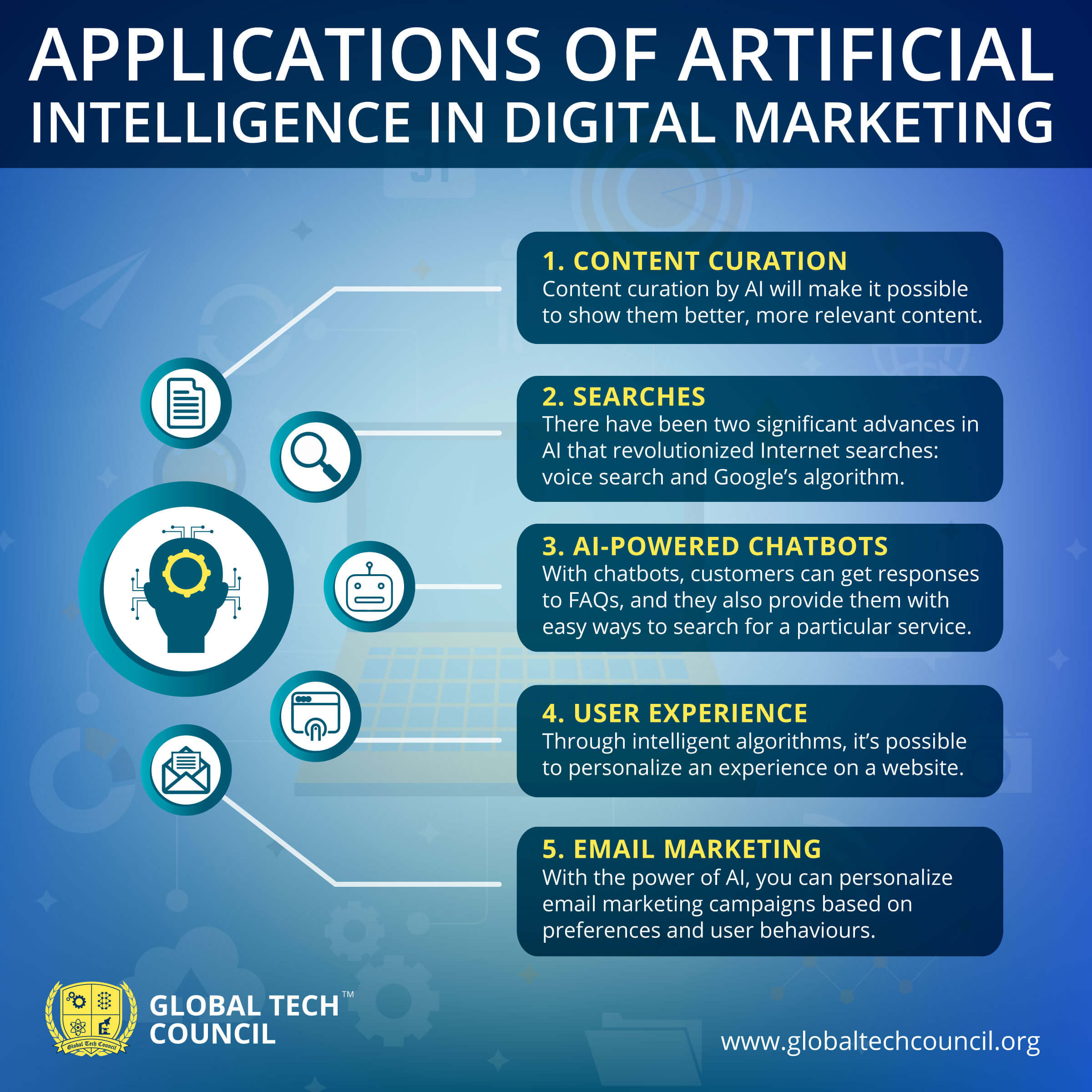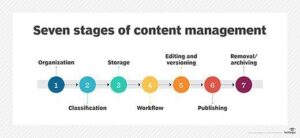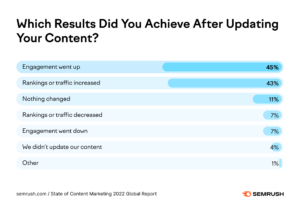Ah, the world of digital marketing! It’s a constantly evolving realm where creativity and technology collide. And one of the most exciting advancements in this field is the use of Artificial Intelligence, or AI, to revolutionize the way businesses connect with their audience. So, you may be wondering, “How is AI used in digital marketing?” Well, my friend, you’re about to find out!
In today’s fast-paced digital landscape, AI has become the secret weapon for marketers looking to gain a competitive edge. From personalized customer experiences to predictive analytics, AI is transforming the way brands engage with their target audience. Gone are the days of generic mass marketing; AI allows businesses to tailor their messages and deliver them at the right time, to the right people, in the right place. It’s like having a digital marketing assistant that knows exactly what your customers want before they even do!
When it comes to digital marketing, AI is a game-changer. It has the power to analyze vast amounts of data, uncover hidden insights, and automate repetitive tasks, leaving marketers with more time to focus on strategic initiatives. So, buckle up and get ready to explore the fascinating world of AI in digital marketing. Trust me, this is one journey you won’t want to miss!

How AI is Used in Digital Marketing
Artificial intelligence (AI) has revolutionized many industries, and digital marketing is no exception. With its ability to analyze vast amounts of data and make predictions, AI has become an invaluable tool for marketers. In this article, we will explore how AI is used in digital marketing and the benefits it brings.
The Role of AI in Data Analysis
In the world of digital marketing, data is crucial. Marketers need to understand their target audience, track their campaigns’ performance, and make data-driven decisions. This is where AI comes in. AI algorithms can analyze massive amounts of data in real-time, identifying patterns and trends that humans may miss. By leveraging AI, marketers can gain valuable insights into their customer behavior, preferences, and market trends.
AI-powered analytics tools can track and measure various metrics, such as website traffic, engagement rates, and conversion rates. This data can help marketers understand which marketing strategies are effective and which ones need improvement. With AI, marketers can make data-driven decisions that optimize their campaigns and achieve better results.
Benefits of AI in Data Analysis for Digital Marketing
1. Improved Personalization: AI algorithms can analyze customer data to create personalized experiences. By understanding individual preferences, AI can deliver targeted content, offers, and recommendations to each customer, increasing engagement and conversions.
2. Real-time Insights: AI-powered analytics provide real-time data, allowing marketers to monitor campaign performance and make timely adjustments. This enables marketers to optimize their strategies, respond to market trends, and stay ahead of the competition.
3. Cost Efficiency: AI automates data analysis, reducing the need for manual labor and resources. This improves cost-efficiency and allows marketers to allocate their budget to other areas of their campaigns.
4. Enhanced Customer Experience: By leveraging AI, marketers can provide a seamless and personalized customer experience. AI-powered chatbots, for example, can interact with customers in real-time, answering their queries and providing assistance, enhancing customer satisfaction.
The Role of AI in Content Creation
Creating engaging and relevant content is crucial for digital marketing success. AI can assist marketers in content creation by analyzing data and generating insights. AI algorithms can analyze customer behavior, social media trends, and market data to identify content ideas that resonate with the target audience.
AI-powered tools can also generate content automatically. For example, AI can create personalized email campaigns, social media posts, and even blog articles. These tools use natural language processing and machine learning to understand the target audience’s preferences and create content that matches their interests.
Benefits of AI in Content Creation for Digital Marketing
1. Increased Efficiency: AI-powered content creation tools can save marketers significant time and effort. By automating content generation, marketers can focus on other strategic tasks, such as campaign planning and optimization.
2. Improved Quality: AI algorithms can analyze vast amounts of data to generate content ideas that resonate with the target audience. This helps marketers create more relevant and engaging content that drives better results.
3. Better SEO Optimization: AI can help marketers optimize their content for search engines. By analyzing keywords, trends, and user behavior, AI algorithms can suggest optimizations that improve search rankings and increase organic traffic.
4. Personalized Messaging: AI-powered content creation tools can generate personalized messages based on customer data. This enables marketers to deliver tailored content to each customer, increasing engagement and conversions.
The Role of AI in Customer Relationship Management (CRM)
Customer relationship management is essential for any business. AI can enhance CRM systems by analyzing customer data, predicting customer behavior, and automating customer interactions. AI-powered CRM systems can segment customers based on their preferences, purchase history, and engagement levels, allowing marketers to create targeted marketing campaigns.
AI can also automate customer interactions through chatbots and virtual assistants. These AI-powered tools can handle customer inquiries, provide real-time support, and even make product recommendations. By automating these interactions, businesses can provide a seamless and personalized customer experience.
Benefits of AI in CRM for Digital Marketing
1. Targeted Marketing Campaigns: AI-powered CRM systems enable marketers to segment customers and create personalized marketing campaigns. By delivering targeted messages, marketers can increase engagement and conversions.
2. Improved Customer Service: AI-powered chatbots and virtual assistants can provide instant support to customers, answering their queries and guiding them through the purchase process. This enhances customer satisfaction and builds trust.
3. Predictive Analytics: AI algorithms can analyze customer data to predict future behavior and preferences. This helps marketers identify upselling and cross-selling opportunities, as well as anticipate customer needs.
4. Streamlined Operations: AI automates repetitive tasks, such as data entry and lead scoring, allowing marketers to focus on strategic activities. This improves operational efficiency and enables marketers to allocate their time and resources effectively.
The Role of AI in Advertising
Advertising is a crucial aspect of digital marketing, and AI has transformed the way ads are created, delivered, and optimized. AI algorithms can analyze customer data to identify the most relevant ad placements, audiences, and messaging. By leveraging AI, marketers can create highly targeted and personalized ads that drive better results.
AI-powered ad platforms can also automate the ad buying process. These platforms use real-time data and machine learning to optimize ad placements, budgets, and bidding strategies. This ensures that ads are displayed to the right audience at the right time, maximizing their impact.
Benefits of AI in Advertising for Digital Marketing
1. Improved Ad Targeting: AI algorithms can analyze customer data to target ads to the most relevant audience. This increases the chances of ad engagement and conversions.
2. Real-time Optimization: AI-powered ad platforms can optimize ad placements, budgets, and bidding strategies in real-time. This ensures that ads perform at their best and generate the highest return on investment.
3. Enhanced Creativity: AI can assist marketers in creating more engaging and creative ads. By analyzing customer preferences and market trends, AI algorithms can suggest ad elements that resonate with the target audience.
4. Cost Efficiency: AI-powered ad platforms can optimize ad spend by identifying the most cost-effective placements and bidding strategies. This helps marketers achieve their advertising goals while minimizing costs.
The Future of AI in Digital Marketing
AI is continuously evolving, and its impact on digital marketing is only expected to grow. As AI technologies become more advanced, marketers can expect even more sophisticated data analysis, content generation, customer interactions, and advertising capabilities.
In conclusion, AI has become an indispensable tool in digital marketing. Its ability to analyze data, generate insights, and automate processes has transformed the way marketers operate. By embracing AI, marketers can unlock new opportunities, improve campaign performance, and deliver better experiences to their customers. The future of digital marketing is undoubtedly intertwined with the advancements of AI technology.
Key Takeaways: How AI is Used in Digital Marketing
- AI helps analyze customer data and behavior to personalize marketing campaigns.
- AI-powered chatbots improve customer service and engagement on websites.
- AI assists in optimizing ad targeting and delivering relevant ads to the right audience.
- AI automates repetitive tasks like content creation and social media scheduling.
- AI enhances data analysis and predictive modeling for better decision-making in marketing strategies.
Frequently Asked Questions
Question 1: What are the main applications of AI in digital marketing?
AI has revolutionized the field of digital marketing, offering numerous applications that enhance marketing strategies. One key application is chatbots, which use natural language processing to provide instant customer support. These virtual assistants can handle customer inquiries, provide personalized recommendations, and even complete transactions. Additionally, AI-powered algorithms are used for data analysis, allowing marketers to gain valuable insights into customer behavior and preferences. This helps in creating targeted advertising campaigns and delivering personalized content to users. AI is also utilized in content creation, with algorithms generating relevant and engaging content based on user preferences and search patterns.
Another major application of AI in digital marketing is predictive analytics. By analyzing large volumes of data, AI algorithms can predict customer behavior, allowing marketers to anticipate trends and make informed decisions. AI-powered tools can also automate repetitive tasks such as email marketing, social media management, and campaign optimization. This frees up time for marketers to focus on more strategic activities. Overall, AI is used in digital marketing to enhance customer experience, improve targeting and personalization, and optimize marketing campaigns for better results.
Question 2: How does AI improve customer targeting in digital marketing?
AI plays a crucial role in improving customer targeting in digital marketing. By analyzing vast amounts of data, AI algorithms can identify patterns and trends in customer behavior, preferences, and demographics. This allows marketers to create highly targeted and personalized campaigns that resonate with their target audience. AI-powered tools can segment customers based on their interests, purchase history, browsing behavior, and other relevant factors. This enables marketers to deliver tailored content and offers to specific customer segments, increasing the chances of conversion.
Moreover, AI algorithms can continuously learn and adapt to changing customer preferences, ensuring that targeting remains effective over time. AI-powered recommendation engines are also used to suggest relevant products or content to customers based on their previous interactions and preferences. This enhances the customer experience, increasing engagement and loyalty. By leveraging AI for customer targeting, marketers can maximize their marketing efforts, improve ROI, and build stronger relationships with their customers.
Question 3: Can AI help with content creation in digital marketing?
Yes, AI can be a powerful tool for content creation in digital marketing. AI-powered algorithms can analyze vast amounts of data to identify popular topics, keywords, and trends, helping marketers generate relevant and engaging content. AI can also assist in optimizing content for search engines by suggesting keyword placements and providing insights on user intent. This improves the chances of content ranking high in search engine results.
Additionally, AI can automate the process of content generation by creating personalized content based on user preferences and browsing behavior. This can range from dynamically generated product descriptions to personalized email newsletters. AI algorithms can also help in proofreading and editing content, ensuring it is error-free and well-structured.
However, it is important to note that while AI can assist in content creation, it cannot fully replace human creativity and expertise. The human touch is still essential in crafting compelling stories and connecting with the audience on an emotional level. Therefore, AI should be seen as a valuable tool that complements human efforts in content creation.
Question 4: How does AI enhance customer experience in digital marketing?
AI plays a significant role in enhancing customer experience in digital marketing. Chatbots powered by AI are one example of how AI technology improves customer support and engagement. These virtual assistants can provide instant responses to customer queries, offering 24/7 support and reducing response times. Chatbots can also personalize interactions by remembering customer preferences and previous interactions, creating a more personalized experience.
AI-powered recommendation engines are another way AI enhances customer experience. By analyzing customer behavior and preferences, these engines can suggest relevant products, services, or content to customers, increasing engagement and satisfaction. This creates a more personalized and tailored experience, making customers feel valued and understood.
Furthermore, AI can improve the overall user experience by optimizing website navigation, personalizing user interfaces, and offering targeted content. For example, AI algorithms can analyze user behavior and preferences to customize website layouts, ensuring that users find relevant information quickly and easily. By leveraging AI to enhance customer experience, businesses can foster customer loyalty, increase engagement, and drive conversion rates.
Question 5: How can AI optimize digital marketing campaigns?
AI offers several ways to optimize digital marketing campaigns. One key application is predictive analytics, where AI algorithms analyze large datasets to identify trends and predict customer behavior. By understanding customer preferences and anticipating their needs, marketers can optimize their campaigns to deliver the right message to the right audience at the right time.
AI can also automate various aspects of campaign management, such as A/B testing, ad optimization, and audience targeting. AI-powered tools can continuously monitor campaign performance and make real-time adjustments to improve results. This saves time and resources while ensuring that campaigns are constantly optimized for maximum effectiveness.
Additionally, AI algorithms can analyze customer data to identify segments with the highest conversion potential. By focusing marketing efforts on these high-value segments, marketers can allocate resources more efficiently and achieve better ROI. AI can also assist in budget allocation by recommending the optimal distribution of funds across different channels and campaigns.
In summary, AI optimizes digital marketing campaigns by providing predictive insights, automating tasks, and enabling efficient resource allocation. By leveraging AI technology, marketers can improve campaign performance, increase ROI, and achieve better results in their digital marketing efforts.
Artificial Intelligence explained in 3 minutes | 3 Applications in Marketing
Final Summary: How AI is Revolutionizing Digital Marketing
As we reach the end of this journey exploring how AI is used in digital marketing, it’s clear that artificial intelligence has become an indispensable tool for businesses looking to thrive in the digital landscape. By leveraging the power of AI, companies can gain valuable insights, streamline processes, and deliver personalized experiences to their customers.
AI is transforming the way digital marketers approach their strategies, enabling them to analyze vast amounts of data, automate tasks, and optimize campaigns in real-time. From chatbots providing instant customer support to predictive analytics guiding decision-making, AI is revolutionizing the industry.
With AI-powered tools and algorithms, digital marketers can now target the right audience, create compelling content, and improve customer engagement. The ability to harness AI’s capabilities to understand user behavior, identify patterns, and make data-driven decisions is invaluable in a competitive online landscape.
Moreover, AI is constantly evolving, and as technology advances, we can expect even more innovative applications in the realm of digital marketing. From voice search optimization to hyper-personalization, AI will continue to shape the future of marketing.
So, embrace the power of AI in your digital marketing efforts, and stay ahead of the curve in this ever-changing digital world.







